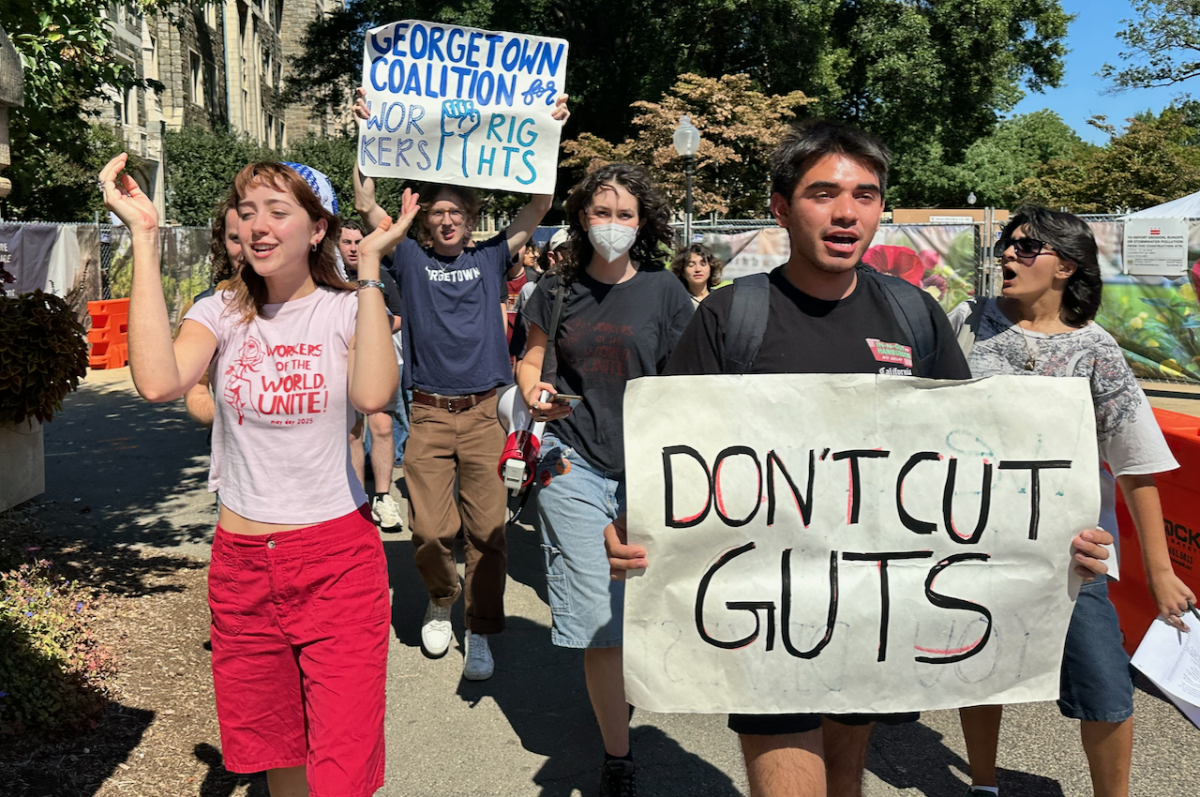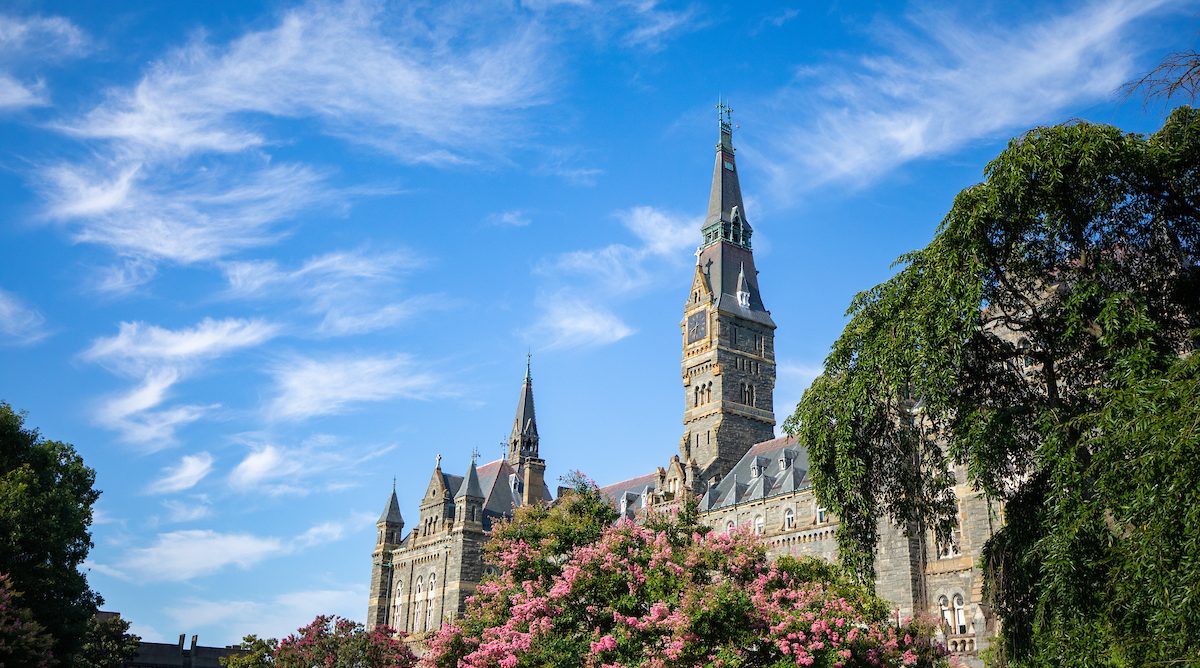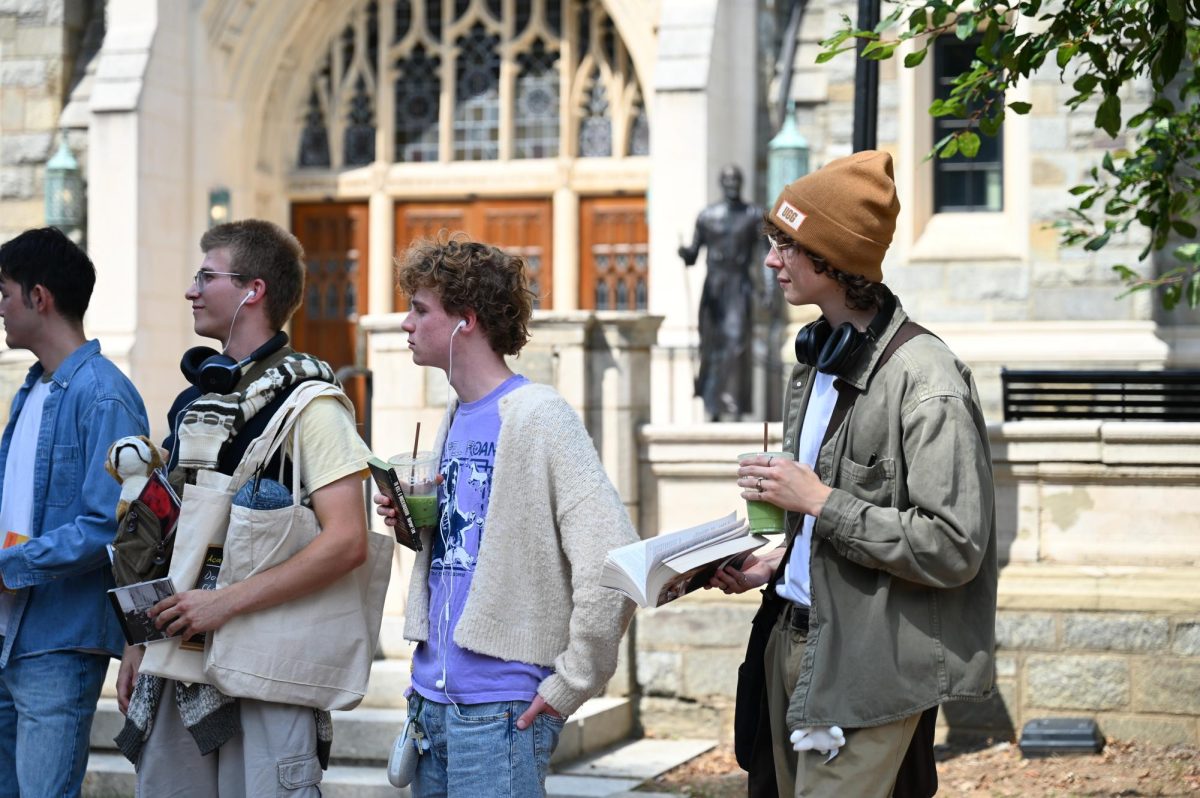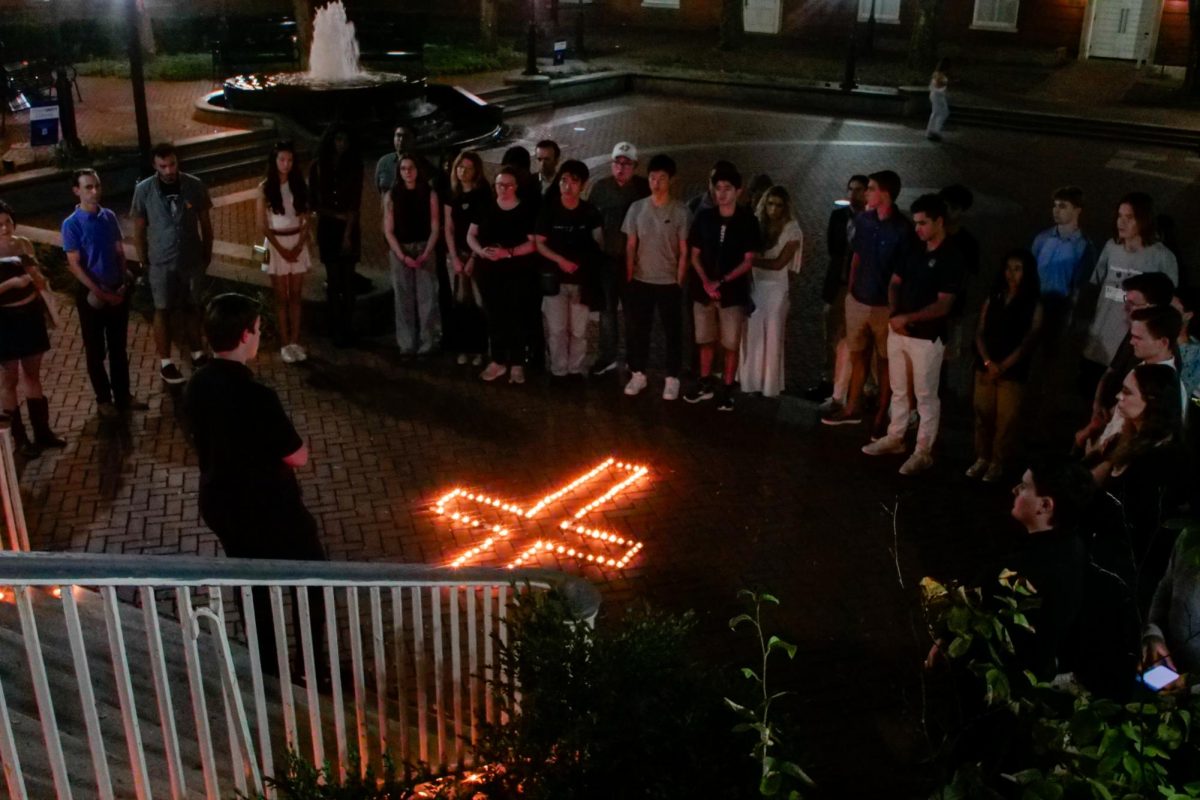About 150 members of the Georgetown University community rallied against the detainment of Badar Khan Suri, the Georgetown postdoctoral researcher held by federal immigration officials, at a walkout March 25.
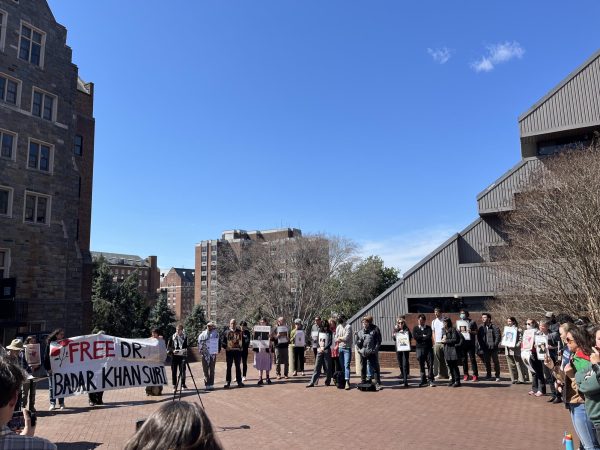
The Georgetown chapter of Faculty and Staff for Justice in Palestine (FSJP), an organization of Georgetown employees who support Palestinian self-determination, coordinated the rally to demand Khan Suri’s release and stronger protections for free speech. Demonstrators gathered in Red Square eight days after federal immigration officials detained Khan Suri outside his Rosslyn, Va., home over alleged connections to Hamas leadership and social media posts deemed to be “Hamas propaganda.”
At the rally, speakers including Fida Adely, an FSJP member and anthropologist who serves as the director of Georgetown’s Center for Contemporary Arab Studies (CCAS), said attendees need to show solidarity and unity amid repression of free speech.
“No one is safe any longer, and this is why we’re all out here,” Adely said. “This is the time for solidarity, it’s a time for building networks and building bridges, and it’s a time for us to come together to protect the most vulnerable in our communities.”
Walkout attendee Fiona Naughton (SFS ’26) said the walkout aimed to demonstrate support for Khan Suri, even as his detainment prompted fears of political retaliation.
“It was a beautiful demonstration of the strength of this movement,” Naughton told The Hoya. “The fact that there were so many people there today, and you could see the pain on people’s faces, the terror. There were so many people in masks and hoodies and sunglasses because there is genuinely such fear of speaking out in favor of justice. It is a testament to the fact that there needs to be unity at this time.”
Khan Suri, an Indian citizen who was in the United States legally on a J-1 visa for researchers, worked as a postdoctoral fellow at the School of Foreign Service’s Alwaleed Center for Muslim-Christian Understanding (ACMCU), researching cooperative peace strategies and democratic institutions and teaching a course on South Asian politics. Khan Suri is currently in federal custody at the Prairieland Detention Facility in Alvarado, Texas, according to a federal online locator of detainees.
University interim president Robert M. Groves described Khan Suri’s detention as “troubling” and asserted a commitment to free speech grounded in Georgetown’s Jesuit values.
“The Jesuit commitment to inter-religious and inter-group dialogue demands that we protect the freedom to articulate ideas and beliefs, that we build a community that respects their presentation, and that we together use the different perspectives to do what the human spirit was designed to do — seek the truth as a way to deepen our understanding of the world around us,” Groves wrote in a March 25 email to community members. “The Jesuits do these things for the greater glory of God and to advance the common good.”

Besides Khan Suri, the Trump administration has also targeted pro-Palestinian student protesters at Columbia University and Cornell University, including by detaining Mahmoud Khalil, a leader of Columbia’s protest movement last spring. The administration attributed both Khalil’s and Khan Suri’s detention in part to their pro-Palestinian speech, raising concerns for many rally-goers about academic freedom and free speech.
Maurice Jackson, a history and African American studies professor, said he attended the rally to fight for academic freedom.
“We’re a university — if one can’t speak and hold opinions in a university, then where can they hold them?” Jackson told The Hoya. “Here’s a man who came here to raise his family, to try to provide a better life, and to develop his own ideas about life. He has an opinion about the Middle Eastern situations, so do I, so do many of us, and it’s our right to express those.”
ACMCU director Nader Hashemi, an associate professor of Middle East and Islamic politics, described Khan Suri’s detention as the start of a slippery slope of repression.
“If you don’t have free speech, and if you don’t have academic freedom, you don’t have a university,” Hashemi told The Hoya. “These are principles that are now under attack from the Trump administration.”
“It starts with 1,000 little cuts and then, before you know it, you can’t push back against an authoritarian regime,” Hashemi added. “I think the stakes here are very high.”
Groves said committing to free speech is essential to Georgetown’s educational mission.
“Our University must foster and nurture a variety of viewpoints on every issue, in classes, in campus discussions,” Groves wrote. “This is the only way for us to get closer to the truth. To do this, the University, as an academic community, needs students and faculty with different worldviews.”
Many rallygoers, including Jamie Madden, an assistant teaching professor in the women’s and gender studies program, said they hoped their attendance would demonstrate solidarity with other members of the Georgetown community who are afraid to speak out.
“We’re focused on this one person, but also people who are similarly positioned: people who are afraid to be on record, people who are afraid to leave their dorms, people who are undocumented, people who are afraid to travel,” Madden told The Hoya. “I hope that they see that they’re supported, that they feel cared for by people here.”
Though faculty and staff members organized the rally, students also walked out of their classes in support.
Tai Remus Elliot (University of Edinburgh), an exchange student from the United Kingdom, said the Trump administration’s crackdown on protests inspired him to join the rally to support Khan Suri and other pro-Palestinian voices on campus.
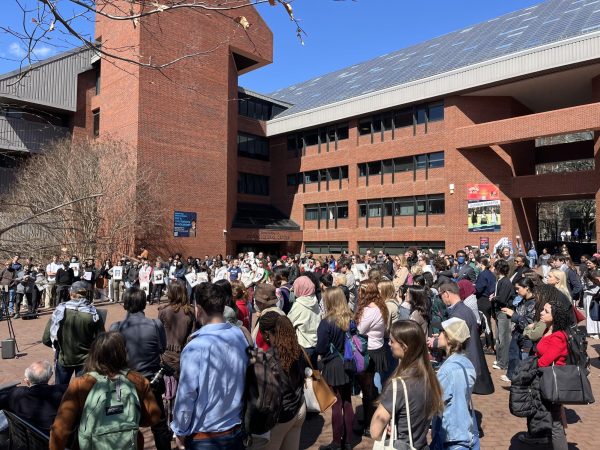
“The time at which protest is under attack is the most important time to be out here and protesting,” Elliot told The Hoya. “Just raising your voice is important. It feels very helpless being a student right now, but that’s no excuse to do nothing.”
“It’s important for people who are affected more personally than me to know how many of us support Palestine, support free speech, support the right to protest,” Elliot added.
Claire Hazbun (SFS ’20, GRD ’30), a doctoral student who also attended the rally, said she attended to call on others to advocate for Khan Suri.
“I think we need to keep speaking out, encouraging our administration to do advocacy at the highest levels, to push back against the Trump administration and the tactics that are being used, and to be in community with one another,” Hazbun told The Hoya. “For us that are able to, we need to be vocal.”
Besides pushing for Khan Suri’s release, attendees including Naughton also called on Georgetown to declare itself a “sanctuary campus” and refuse to cooperate with federal law enforcement unless compelled to by law.
“Georgetown has to demonstrate an absolute commitment to its community members,” Naughton said. “Right now, what we’re seeing through these acts of terror, through deportation and incarceration of academics, is that now more than ever Georgetown has to declare itself a sanctuary campus.”
J.R. Osborn, a professor in the graduate communication, culture and technology program, said the university needs to call on its Jesuit value of “cura personalis,” or care for the whole person, in protecting Khan Suri and all faculty.
“If our colleagues are in fear of being arrested, doxxed, targeted for the things that they are saying, for the things that they believe in, for the things that they are teaching, then our whole person is not being cared for,” Osborn told The Hoya.
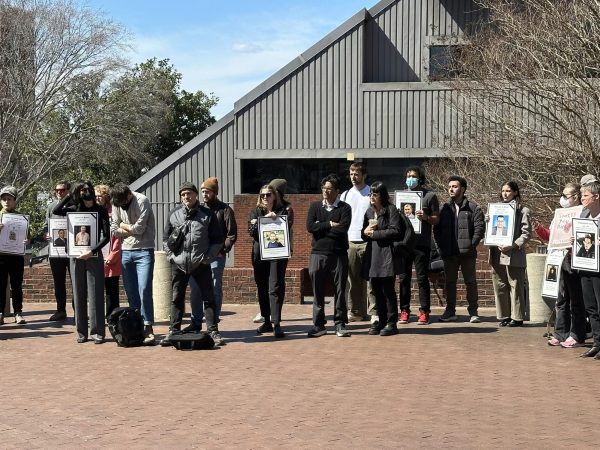
Groves said the university is committed to maintaining diverse freedom of expression.
“The University has rules that protect our community members’ rights to free and open inquiry, deliberation and debate, even if the underlying ideas may be difficult, controversial or objectionable,” Groves wrote. “We give the widest possible latitude to freedom of expression while respecting its limits, such as harassment and discrimination, which can impede the rights of others to freely participate in the exchange of ideas.”
A university spokesperson did not immediately respond to a request for comment.
Jackson said the university community should push back on intrusions of academic freedom and prevent future detainments.
“I hope the university will issue a strong statement that will prevent anyone from harming anyone on this campus, I hope the faculty will come together in some united effort, and most importantly, I hope the American people will see that what is being done is wrong and is an injustice,” Jackson said.
Hashemi said protestors will continue to advocate for Khan Suri and free speech on university campuses.
“We’re not going to stay silent, we’re going to continue to hold our university officials and elected officials accountable for his arrest, and we’re going to keep fighting until he’s released,” Hashemi said. “There’s a lot of anger over this issue, and it’s not going to dissipate.”
Nora Toscano and Ruth Abramovitz contributed to reporting.


